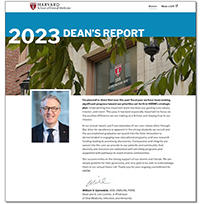
Regular visits to the dentist are not only good for a routine examination and cleaning, but also for the detection of oral cancer – cancer that develops in areas in and around the mouth, such as the tongue, mouth lining, lips, gums, or in the back of the throat. Approximately 58,500 people in the U.S. will be newly diagnosed with oral cancer this year, according to the Oral Cancer Foundation.
We asked Dr. Piamkamon Vacharotayangul, a leading expert in the field of oral medicine, infection and immunity, what causes oral cancer, the symptoms that can appear, and the treatments available for patients. Vacharotayangul is an instructor in Harvard School of Dental Medicine’s (HSDM) Department of Oral Medicine, Infection and Immunity, and program director of the Advanced Graduate Education Program in Oral Medicine. She oversees the residency program at HSDM and Brigham and Women's Hospital that is also integrated with oncology services at Dana Farber Cancer Institute.
What do the first signs of oral cancer look like?
Vacharotayangul: The first signs of oral cancer can vary, but common early symptoms may include persistent mouth ulcers or sores, red or white patches on the tongue or lining of the mouth, swelling or lumps in the mouth tissues, or unexplained bleeding in the mouth.
What do I do if I notice a suspicious looking bump or sore in my mouth?
Vacharotayangul: If you see a bump or sore in your mouth that sticks around for more than two weeks and makes you worry, don't wait around. Get in touch with your dentist or doctor as soon as you can. They'll give it a good look and let you know what to do next. Early detection is key, especially when it comes to your oral health. So, if you have any doubts or worries, it's best to get them checked out sooner rather than later.

Vacharotayangul: Yes, during your regular dental checkups, your dentist usually takes a look around your mouth for any signs of oral cancer and other abnormalities. They'll check for things like unusual sores, patches, lumps, or swelling. If they find anything that concerns them, they'll likely want to take a closer look or refer you to a specialist for further evaluation. It's just another reason why keeping up with your dental checkups is so important.
Do environmental factors or genetics influence risk of getting oral cancer?
Vacharotayangul: Both environmental factors like tobacco and alcohol use, excessive sun exposure, and HPV infection, as well as genetic predisposition, can influence the risk of developing oral cancer. Being aware of these factors and taking preventive measures such as avoiding tobacco and alcohol, practicing good oral hygiene, limiting sun exposure, and discussing family history with healthcare providers can help manage this risk. Regular screenings for early detection are also essential.
We know that smoking or chewing tobacco can lead to oral cancer, what about vaping or smoking marijuana?
Vacharotayangul: The effects of vaping or smoking marijuana on oral cancer risk are still being studied. Early findings suggest that both vaping and marijuana smoking could expose users to harmful substances that might increase the risk, but we need more research to be sure. So, it's wise to be mindful of what you're smoking and how it could affect your oral health.
What are the latest developments and treatments in the field?
Vacharotayangul: The field of oral cancer research and treatment continues to evolve, with several promising developments in recent years. Some of the latest advancements include immunotherapy and targeted therapy.
- Immunotherapy drugs, such as checkpoint inhibitors, have shown promise in treating certain types of oral cancer by helping the immune system recognize and attack cancer cells. Some of these include, pembrolizumab which targets the PD-1 protein on immune cells, making the immune system able to recognize and attack cancer cells, has been approved for the treatment of certain types of metastatic or recurrent oral cancer; nivolumab is another checkpoint inhibitor.
- Targeted therapy drugs are designed to specifically target cancer cells while sparing healthy cells. An example is cetuximab which inhibits the epidermal growth factor receptor (EGFR), often overexpressed in oral cancer cells. It is used in combination with chemotherapy or radiation therapy for the treatment of advanced or metastatic oral cancer.
The recognition of oral medicine specialty by the American Dental Association (ADA) in 2020 has led to more interest in the practice of this unique dental specialty and its role in giving care to oncology patients, not limited to oral cancer patients. Specialized oral medicine dentists collaborate closely with oncologists to offer comprehensive support, focusing on oral symptom management and addressing the unique oral and dental needs of patients throughout the treatment journey. These efforts aim to alleviate pain, manage discomfort, and optimize overall well-being starting from the oral cavity.


